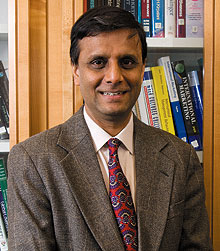  |
| HOME | THIS ISSUE | CALENDAR | GRANTS | BACK ISSUES | < BACK | NEXT > |
Business professor teaches marketing concepts in Peru by David Bauman - September 22, 2008 | ||||
| Teaching marketing research skills is a challenge under the best of circumstances, but even more so when the students live in a nation that is politically volatile and where counterfeit products dominate the marketplace. That was the setting for Narasimhan Srinivasan, an associate professor of marketing in UConn’s School of Business, who recently spent six weeks in Lima, Peru, teaching executives and MBA students new marketing concepts and consumer survey strategies as a Fulbright Senior Specialist. He was among some 30 U.S. business faculty awarded the prestigious grants to teach their specialties at institutions across the globe this summer. Srinivasan, who has extensive experience in short-term academic exchanges including a previous Fulbright scholarship to Canada, says he was specifically recruited by Peru’s ESAN University, the oldest and No. 1 ranked business school in South America. During his stay, he taught a course on survey research, a research seminar on cross cultural strategies, developed marketing course syllabi, evaluated a new undergraduate marketing program ESAN plans to launch this fall, and conducted some research. His classes were delivered in English but simultaneously translated into Spanish. Peru is one of the poorest countries in Latin America. A small elite controls most of the wealth and political power, and the country has long alternated between democracy and military dictatorship. It remains deeply divided politically, Srinivasan says. In the past 20 years, hyperinflation – as high as 7,500 percent – fueled a Maoist guerrilla insurgency that forced many Peruvians to flee the country. Despite the near destruction of the Shining Path and Tupac Amaru guerrilla groups, violence is still a problem and has been linked to the drug trade. Srinivasan says Peruvians face a lot of uncertainty about the stability of their political system. “Many in my classes in Peru have family members living in the United States,” he says. “They left during the 90s when the political environment was very volatile and terrorism was rampant. “After two decades of turmoil,” he adds, “Lima looks chaotic but has pockets of great prosperity. You see razor wire and hired security guards surrounding many communities. It’s unnerving.”
Despite this, he says his students were “incredibly hard working.” Many of his classes were held at night, because most of the students worked by day. “They are eager to understand new marketing techniques and become more entrepreneurial,” he says. Doing business in Peru poses considerable hurdles, however. Srinivasan estimates that 95 percent of the books, music, videos, and computer games he saw in Lima were pirated versions of intellectual property. “The people say they can’t afford the copyrighted version of the products,” he says. In addition, the “formal” market of legal goods is very small when compared to the “informal,” sector, he says. In Lima’s garment district, for example, many types of counterfeited high-end apparel, such as Lacoste shirts, are made by seamstresses working in sweatshop conditions. Srinivasan says he expects his experience in Peru will benefit his students at UConn. “As Americans, we are on the learning curve as global citizens and need to be taken out of our cocoon,” says Srinivasan, who emigrated to the U.S. from India and has been on the faculty of the School of Business since 1987. “Because of globalization, we cannot afford to be isolationist,” he adds. “We need to understand why business people in countries such as Peru are doing what they are doing. I hope to help my students think again about difficult issues of culture and society, such as the benefits of open business relationships in a global world.” |
| ADVANCE HOME UCONN HOME |

